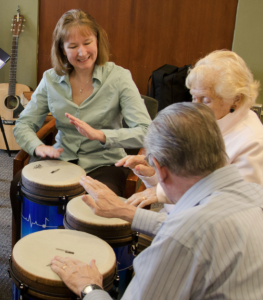Music Therapy for Older People
This AMTA-Pro podcast, Music Therapy for Older People, begins with our colleague Dr. Anne Lipe sharing an overview of music therapy with older adults, including the history of MT services with this diverse population, the impact of the 1991 hearing before the U.S. Senate Special Committee on Aging on the growth of music therapy services and research, and the broad range of possibilities for music therapy services across the spectrum for older people living independently in the community, individuals in assisted living and adult day care, and people living in long-term care facilities. The second part of this podcast features the work of Dr. Betsey King and Laurie Keough in a privately funded music therapy demonstration project for individuals living in the community who are diagnosed with Alzheimer’s. The project, which has since been replicated, not only resulted in the documentation of, among other things, a decrease in agitation and perseveration of words and phrases as well as an increase in social interaction for the participants, but also confirmed the validity of assessment-based small-group and individual music therapy as a cost-effective service significantly impacting quality of life. This podcast ends with an informal discussion of the exciting possibilities for growth in music therapy services for older people in the community and in long-term care.
[display_podcast]
Music Therapy for Older People
AMTA-Pro Podcast July, 2013
Anne Lipe, PhD, MT-BC; Betsey King, PhD, MT-BC; Laurie Keough, MS, MT-BC
— + —
— + —
Information about AMTA-Pro Podcast Speakers
Anne W. Lipe, Ph.D., MT-BC is a Visiting Associate Professor of Music Therapy at Shenandoah University. www.su.edu
Anne comments, “I have enjoyed working and conducting research with older adult populations since becoming a music therapist over 30 years ago. It is exciting to see how music therapy has evolved over the years to meet the needs of older individuals in settings beyond the traditional nursing center! As these opportunities continue to expand, it’s my hope that assessment will play a major role in developing an evidence-based approach to music therapy programming with this population.”
Anne writes, “Since it’s particularly important that music therapists begin to develop evidence-based assessments, I recommend the two timely, provocative articles listed below.”
Hunsley, J. & Mash, E.J. (2008). Developing criteria for evidence-based assessment: An introduction to assessments that work. in J. Hunsley & E.J. Mash (Eds.), A guide to assessments that work (pp. 3 – 14). NY: Oxford University Press.
Jensen-Doss, A. (2011). Practice involves more than treatment: How can evidence-based assessment catch up to evidence-based treatment? Clinical Psychology Science and Practice, 18(2), 173-177.
— + —
Betsey King, PhD, LCAT, MT-BC and Laurie Keough, M.S.Ed., LCAT, MT-BC are at Nazareth College. www.naz.edu/music/undergrad/music-therapy and http://www.naz.edu/health-and-human-services/clinics
Laurie comments, “My clinical interest in the use of music therapy with individuals with Alzheimer’s and dementia focuses on examining the effectiveness of small-group, individualized, assessment-based treatment. During the clinical project discussed in this podcast, an approach using a consistent weekly routine that included repetition and scaffolding was used, incorporating choral singing, participatory singing, signing with singing, group drumming, and instrumental improvisation. The participants in the group demonstrated improvement in all domains, but most notable in this individualized, small-group setting was the demonstration of new learning and procedural memory as well as the development of new skills or and increase in the complexity of skills initially demonstrated. Vital continuing work on this project is addressing the need to “bridge the gap” by creating pilot programs and duplicating the approach in other settings, supporting and providing tools for therapists working in adult care facilities that do not support a job description using this treatment model, and communicating cost-effectiveness.”
Betsey comments, “Over the years, I have had many opportunities to work with older adults. However, the recent gift we at Nazareth College received from a generous and determined community member has helped me and my colleague, Laurie Keough develop a “dream” demonstration program. We have learned so much from our clients and their families. Since our presentation at national conference, we have seen a second demonstration program show the same results we saw, and a private client of mine continues to make steady improvement despite his Alzheimer’s disease. We are determined that more of our music therapy peers have the opportunity to do evidence-based, assessment-driven music therapy in long-term care. To that end, we are developing a program manual that music therapists can use to propose new or expanded programming to administrators.”
Laurie recommends the following resources:
Cevasco, A.M. (2010). Effects of the therapist’s nonverbal behavior on participation and affect of individuals with Alzheimer’s disease during group music therapy sessions. Journal of Music Therapy, 47, 282-299.
Choi, A., Lee, M.S., Lim, H. (2008). Effects of Group Music Intervention on Depression, Anxiety, and Relationships in Psychiatric Patients: A Pilot Study. The Journal of Alternative and Complementary Medicine, 14(5), 567-570.
Clair, A.A. & Bernstein, B. (1990). A preliminary study of music therapy programming for severely regressed persons with Alzheimer’s-type dementia. Journal of Applied Gerontology, 9, 299-311.
Guétin S, et al. (2009). Effect of music therapy on anxiety and depression in patients with Alzheimer’s type dementia: randomised, controlled study. Dementia & Geriatric Cognitive Disorders,28:36-46.
Raglio, A., et al. (2008). Efficacy of music therapy in the treatment of behavioral and psychiatric symptoms of dementia. Alzheimer’s Disease and Associated Disorders, 22, 158-162.
Sherratt, K., Thornton, A., & Hatton, C. (2004). Music interventions for people with dementia: A review of the literature. Aging & Mental Health, 8, 3-12.



